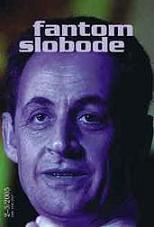

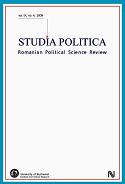
Keywords: Indian tribe; reservation; sovereignty; colonization; justice.
This study explores the legal history of the Indian civilizations of North America. It focuses on the unsual link between the jurisprudence of the United States Supreme Court and the extermination politics practiced by the federal government. Strange enough, these have been some of the limits of the most admired democracy of the world. The analysis explains the racist solution imposed by Justice Marshall, whose legal genius created the concept of ”guard ship” against the Native Americans. Different periods of time, concentrated in their respective ”legal solution” have resulted in the disappearance of most of the North American Indian civilizations. One is surprised to notice the eurocentric vision imposed on these cultures, whose concepts are so very different from ours. Notions like ”tribe”, ”savages”, ”state of pupil age” speak for themselves in order to demonstrate the arguments used for the destruction of a fascinating world and for the justification of the colonization process of the Americas.
More...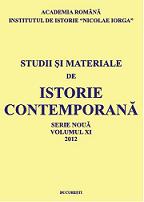
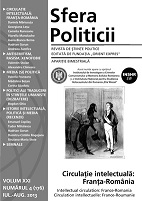
Keywords: publishing houses; Humanitas; mediators; translation; Humanities; politics; communism; post-communism
This article discusses the case of the most prestigious publishing house during post-communism and sets itself to offer several explanations regarding the position held by Humanitas in the Romanian editorial space. It also deals with the role of mediators, collaborators of Humanitas publishing house and with its’ editorial production and its’ evolution with a special focus on translations in the field of French Humanities.
More...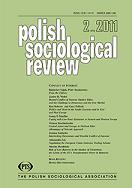
Keywords: Romania; Eu conditionality; rule of law; clientelism; state capture.
This study examines the role of theEuropean Union (EU) and domestic actors in the development of the rule of law (judicial quality) in Romania between 2000 and 2009. This study offers an empirical analysis of rule of law development across two key dimensions (1. judicial capacity, 2. judicial impartiality). The findings of the study show that, while the reform actions of domestic change agents and the EU led to improvement on the judicial capacity dimension of the rule of law (efficiency-related aspects), there was considerable persistence on the judicial impartiality dimension (power-related aspects). The limited transformative power of the EU is explained by the strong resistance of clientelistic veto players, who captured the reform process and undermined the creation of de facto rule of law.
More...Keywords: multiculturalism; public space; European identity; citizenship.
A theme that appears frequently in public debate, in recent years, concerns the future and destiny of a united Europe, from the cultural approach of the European integration, the relationship between national and European level, the relationship between the national cultures in the European space and the possibility of the emergence of a European cultural identity with supranational character. Therefore, the present paper starts from Giovanni Sartori’s assertion according to whom, Europe is faced with the dilemma of multiculturalism versus pluralism aiming to examine whether the model of multiculturalism can be viable given that European public space became a geopolitical environment that is experiencing a new institutional arrangement between nation states and a new paradigm of coexistence of the cultural differences.There are analysed, in chronological perspective, the evolution of the European integration process focusing on the fourth level, the cultural one. Thus, the construction of a common European cultural space that, deeply, closes the citizens, the nations, the ethnicities, the societies and the regions proves to be the most difficult task that removes more and more European Union
More...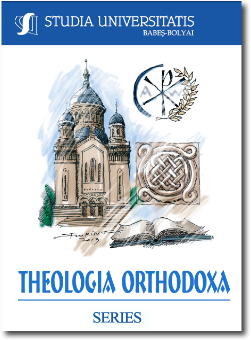
Keywords: Orthodox Church; Transylvanian Saxons; XIXth century; inter-confessional dialogue and relationship; Georg Paul Binder; Georg Daniel Teutsch; Jakob Rannicher.
Born, educated and living in the multilinguistic and multiconfessional space of the Austrian Monarchy, Andrei Şaguna has been able to fructify both the cultural and the patristic heritage of Orthodoxy, and the modern and liberal spirit of the second half of the 19th century, cultivating good relationship with Bishop Georg Daniel Teutsch and friendships with Alois Sentz and Jakob Rannicher. His correspondence and the historiographic evidence reveal these contacts as having been marked by respect, due to the function his acquaintances had in the academic staff, the imperial and local administrative and educational mechanism, but especially by reverence and appreciation. The life, activity, and works of Metropolitan Andrei Şaguna, make him a European figure, because of his formation, his pastoral mission, his strong dedication to education and to bringing the culture closer to the Transylvanian Romanians, and his part in the inter-confessional dialogue before the initiation of the Ecumenical Movement and the official contacts between the Orthodox and the Lutheran churches.
More...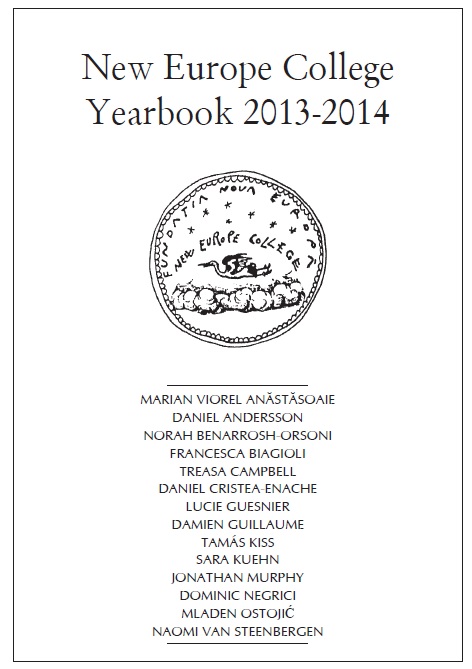
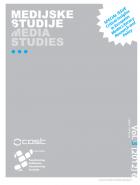
Keywords: media literacy; media education; critical thinking; literacy research methods;
General consensus among policymakers and academics is that media literacy is the ability to access, analyse, and evaluate media in multiple forms and communicate competently within these forms. Yet this seemingly straightforward definition presents methodological challenges in measurement, especially within a national context. Conceptually, approaches to measuring media literacy are often broadly inclusive, without necessarily considering how media literacy is enacted or identifying specific examples of media literate actors within daily contexts. Logistically, indicators are often defined in terms of existing data or data that can be easily collected, rather than choosing stronger measures identified through empirical research. This article examines the methodological challenges associated with measuring national levels of media literacy using the recent Testing and Refining Criteria to Assess Media Literacy Levels in All EU Member States as a case study. The article concludes by recommending more focused measures that account for practices, contexts, and shifting policy priorities.
More...Keywords: mythology; autobiography; parabolic novel; prose essays; indirect confession
The refuge in writing is dictated by the writer’s worry to come out of the terror of personal obsession (the prediction that he would die at 44), the totalitarian daily occurence and the entering under the sign of destiny forged by inner strength and assuming it. Octavian Paler’s works swing between two trends: mythology and autobiography. Although he goes towards literature through Blaga’s poetry influence (The Shadow of Words - 1970), then he will move to the essay, publishing books hard to fit into a specific genre (essay, memoirs), structuring gradually on a "Paler genre - one that is unmistakable and impossible to imitate" (Mircea Iorgulescu). His work does not go within a single genre, it ranges from narrative prose to essays or ideas. It addresses several literary formulas: a journey diary, debate, controversy, correspondence, memoirs, a work of imagination – the parabolic novel, the essay novel (the two novels can be approached from several perspectives: reading in an autobiographical grid, political allegory about totalitarian worlds, a parable of the human condition). In all the works of the same fore-December era it looks like constant the same search towards himself through self confessions and meditations. In this era, the confession is indirect and erudite, achieved through fiction or art critics. The type of fore-December era writing abounds in dissimulative strategies, opposite to the direct confession specific to the post-December era.
More...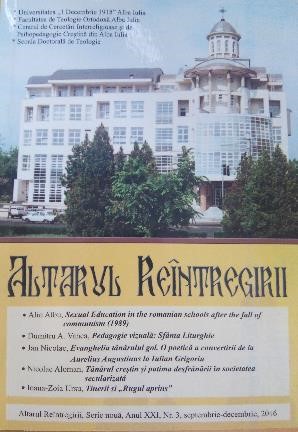
Keywords: activated methods;types of lesson;religious education;learning content;
Religion, as a school subject, has a strong formative nature, with effects on long-term in the child or teenager becoming. In the achievement of the educational process, the Religion teacher may use methodical diversified resources, through which he creates his own teaching style. The use of teachingand learning methods with an activated size seems necessary for creating a student-centered teaching style. To achieve the aims, the teacher is free to choose the most appropriate methods, whether modern or traditional. Since the design stage, Religion class can acquire an activated size by selecting the most appropriate teaching strategies and the types of lessons organisation.
More...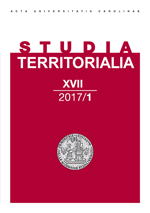
Keywords: United States; counterinsurgency; strategic culture; War on Terror; Afghanistan; Iraq
Counterinsurgency (COIN) doctrine is a very special strategy in the art of war, which involves significantly different tactics than does conventional warfare. U.S. doctrine for combat against insurgents has gone through several changes, the most dramatic of which occurred after 9/11, when theU.S. military faced a new kind of enemy: a global network of fighters, often described as a “global insurgency.” This paper traces the genesis and further development of modern U.S. COIN doctrine. It asks two main questions: How has U.S. COIN doctrine changed after the 9/11 attack? How have its methods, organization and execution changed during the War on Terror? The author assumes that the driving force behind the development of U.S. COIN doctrine is an inter-subjective interpretation of the enemy, the threats and the situation on the battlefield, which can be described as a “strategic culture.” This article uses strategic culture to analyze the genesis and development of modern U.S. COIN doctrine. It also traces the changes in military tactics, strategic priorities and operational procedures that have occurred since 9/11. The author suggests that there have been three phases in the development of U.S. COIN doctrine during the War on Terror: Shock and Awe, Population-centric COIN and Targeted COIN. These phases reveal how the U.S. military has reacted to the emerging challenges it faces.
More...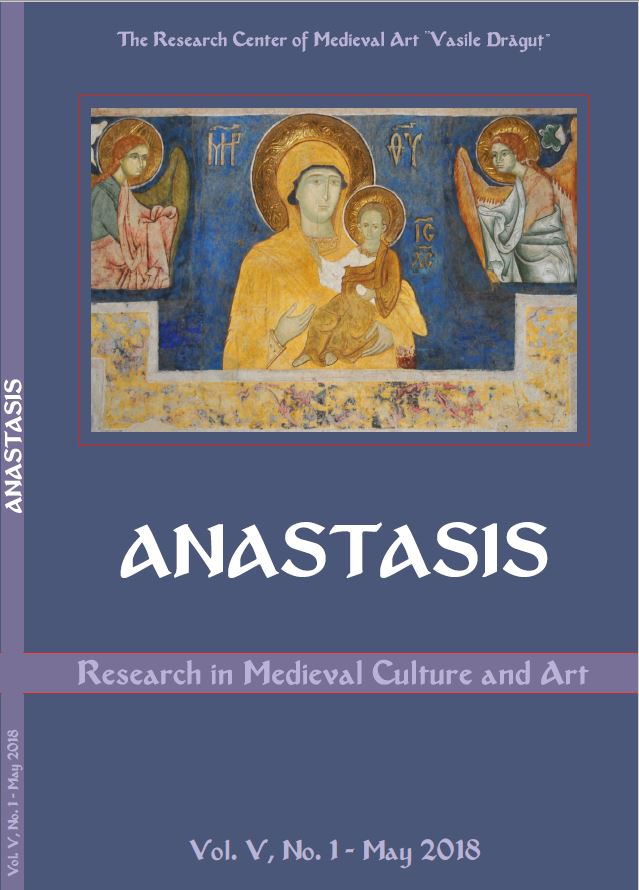
Keywords: medieval period; Pruth-Dniester area; symbolic trepanation; Lozova-La hotar cu Vornicenii; Ciumai; Cimişlia; Crihana Veche
Symbolic trepanation is an invasive procedure, performed on living individuals, without creating a direct connection between the endocranial space and the outer world. Most cases of symbolic trepanation come from the archaeological discoveries made in the Carpathian Basin and in Bulgaria, dating from Early and Middle Age. For the space between Pruth and Dniester rivers, the first symbolic trepanations (14 cases / skulls) were discovered by I. Hîncu, in the medieval necropolises known as Căprăria (10th-12th centuries) and Limbari (12th-14thcenturies). These skulls have one, two or three symbols located on the sagittal suture or in its proximity. In this paper, we propose to the scientific community of the domain four new symbolic trepanation cases, discovered in the space between Pruth and Dniester, namely in the medieval flat necropolis of Lozova-La hotar cu Vornicenii (Grave no.77), in the burial mound no.1 from Ciumai (Grave no.9), in the burial mound no.8 from Cimişlia (Grave no.5) and in the burial mound no.12 (Movila Gologan) from Crihana Veche (Grave no.7). Three skulls belonged to men of different ages and only one to a woman. Two of the four cases have one symbolic mark (on the frontal bone or in the bregma), the other two having two such marks (on the sagittal suture or on the parietal bones, without affecting the sagittal suture). The individuals with only one mark show Europoid features, while those with two symbolic signs on the skull have typologically mixed Europoid and Mongoloid features. Considering the symmetry of symbols, which is evident, we cannot reject their ritualic-symbolic role, probably related to the concept of body integrity changes. The purpose of such a method of body modification could be guided by a series of social and aesthetic standards or by a certain type of self-identification.
More...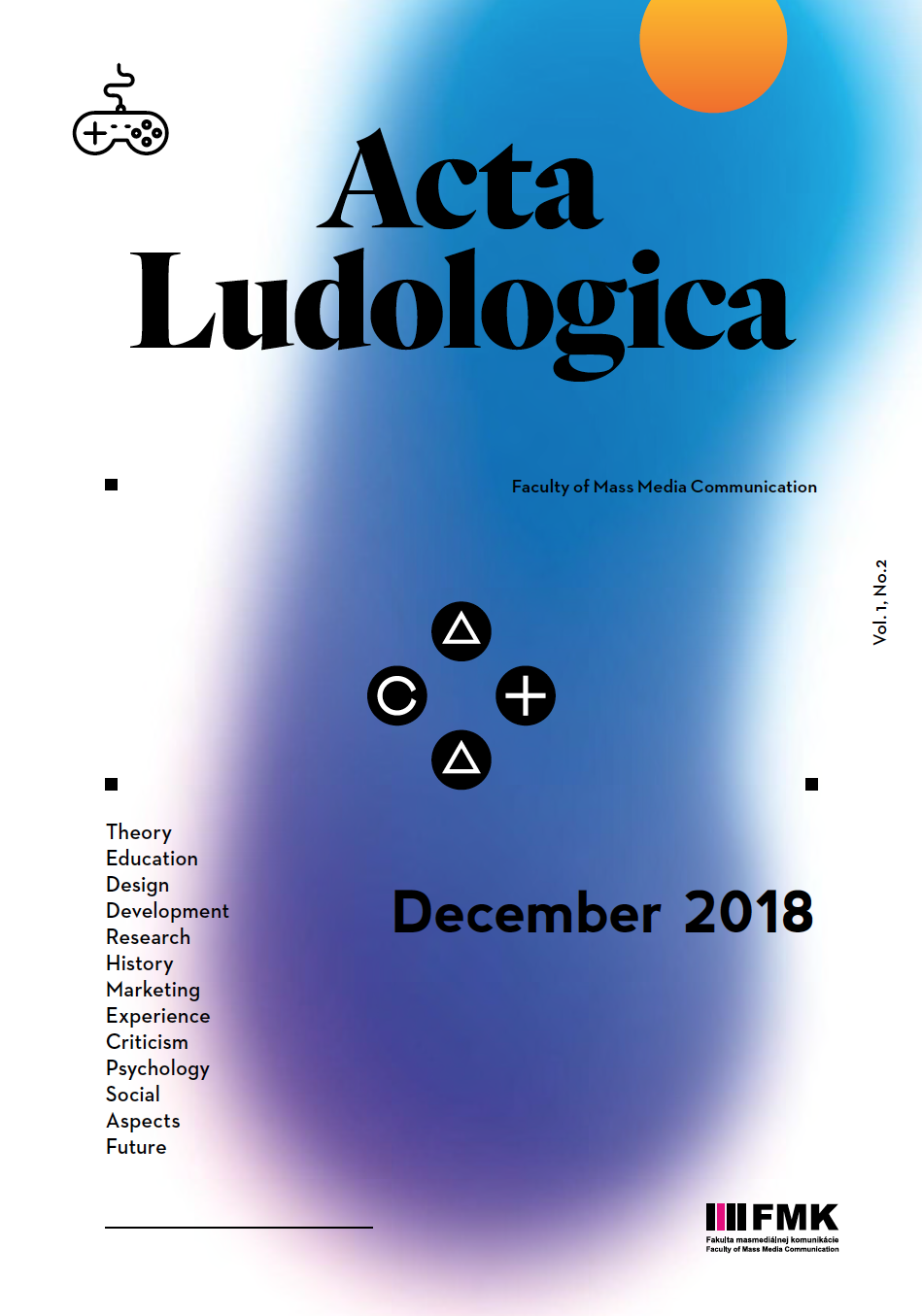
Keywords: arcade games; digital games; game industry; history; portable consoles;
Digital games are one of the biggest cultural phenomenon of our time. From the first primitive devices, throught milestones of age, which inherited cultural status, to the newest technology – every part has its own meaning and proves that humans are playful creatures. But in digital games lies much greater potential, which can be used outside of the gaming industry, because games have an irredeemable place in the majority of the population. In current times we can even talk about gaming society and the author of this overview study sees his goal to process the historical development of digital games, analyse its current state and therefore this study could serve as the theoretical framework for further exploration, such as the future development of this area.
More...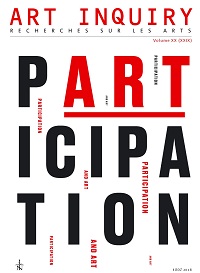
Keywords: Aesthetics; ecology; ecovention; environment; participation
In this paper, we assume that participatory art is an artwork, produced either collectively or by one artist, that invites participants to alter either its appearance, structure, and/or function, though not its purpose. This notion of audience participation is particular useful in discussing ecoventions (Sue Spaid’s term). An ecovention is an “artist-initiated practical action with ecological intent” and its purpose concerns whatever issues the collective who originally implemented it aimed to address. Generally speaking, an ecovention’s purpose concerns maximizing ecosystem functioning. We contend that such projects and various practices implied by them may result in an aesthetic experience of the environment based on the audience’s feeling of participation in the ecosystem and. It is partly a consequence of the fact that ecoventions are artistic projects. We claim that ecoventions as participatory artworks are important because they expand the field of art by including environmental issues in it, offering a new model of audience participation and) they may effectively change for the better the ecological conditions of a particular place.
More...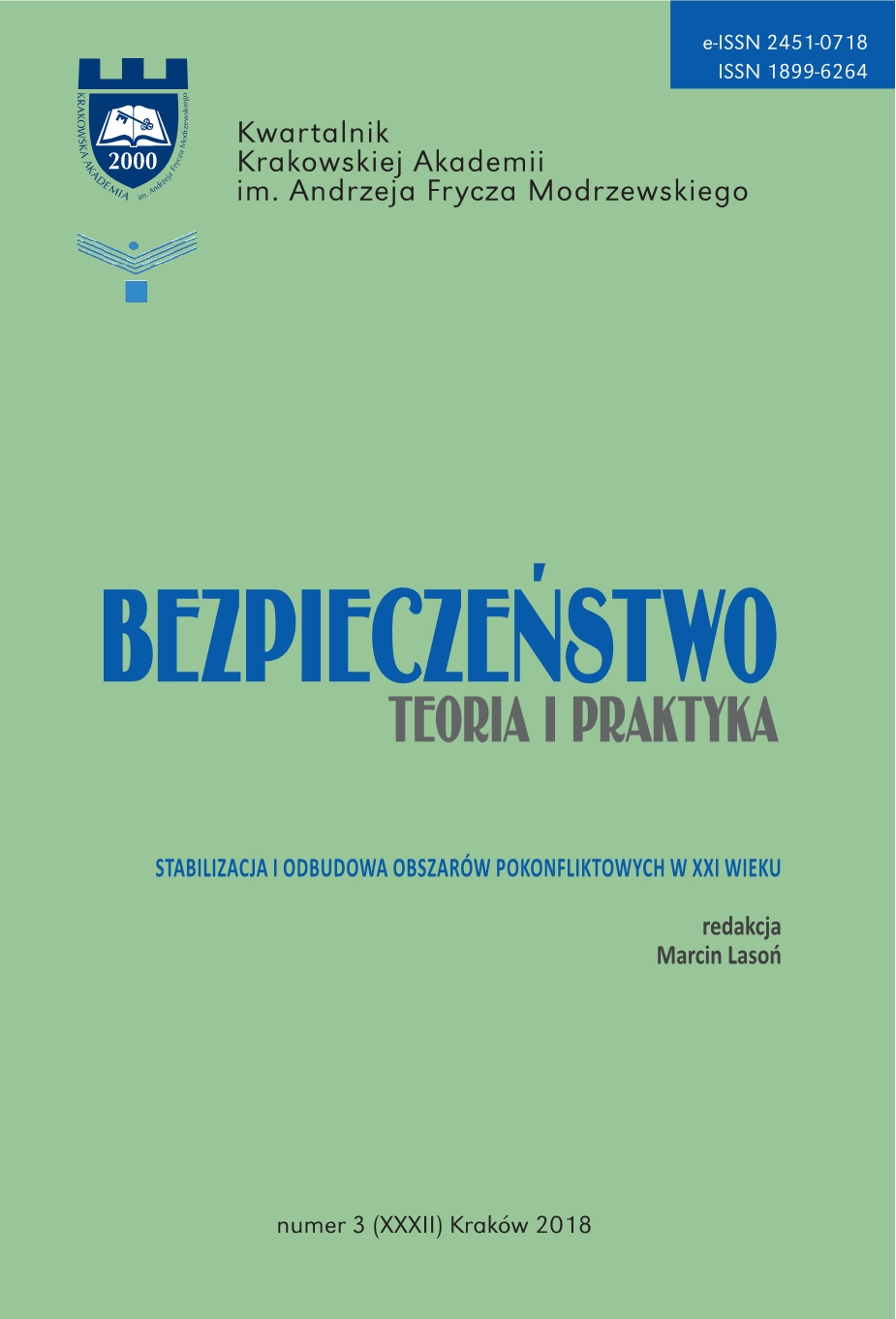
Keywords: conflicts; Iraq; Syria; reconstruction;
Post-conflict reconstruction means strengthening state structures in cooperation with the legitimate authorities of that state or building these structures anew in the case of the so-called failed state. The reconstruction of Iraq after 2003 can be seen in both of the above situations and the desired scenario is quite clear and „straight” – stabilization is connected with the need to guarantee equal rights for Sunni and Shia and satisfy the national aspirations of the Kurds. Syria, on the other hand, remains a serious challenge to the theoretical considerations of the reconstruction because it is not a failed state, but its authorities are not treated as unambiguously legitimate by the international community. The reconstruction of Syria means, above all, the necessity of providing the population with basic needs. The change of the political regime from authoritarian to democratic is very desirable, but the example of violent de-baathification in Iraq demonstrates that such a step may result in the marginalization of the Alawits and thus, another conflict. The future of Iraq and Syria depends to a large extent on the will of the external factor, that is, the political will of the great powers conditioned by their interests.
More...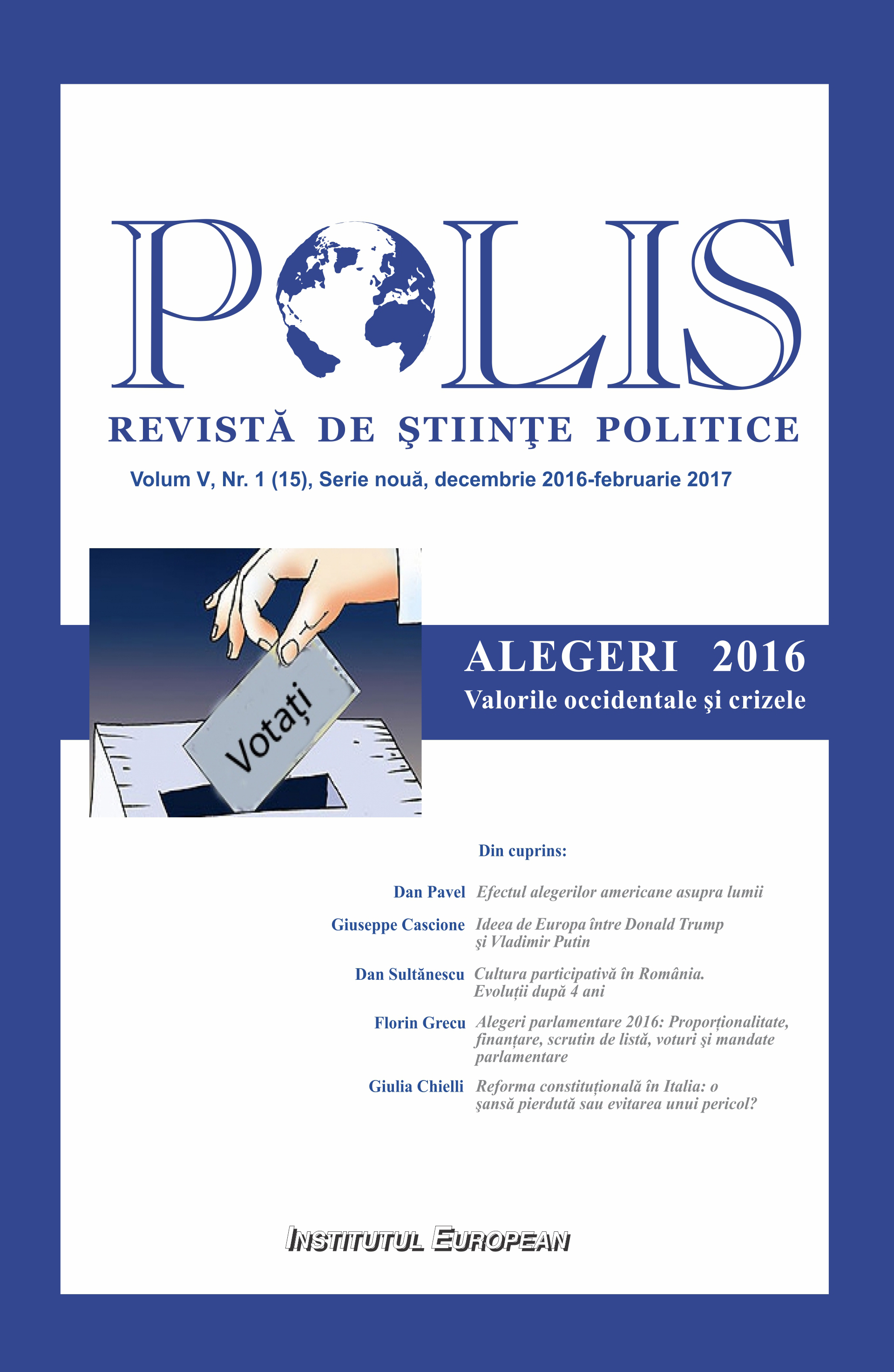
Keywords: Romania; Parliamentary Elections 2016; Anti-corruption; Populism; Integrity; Political programs;
The article investigates the international mass-media coverage for the parliamentary elections in Romania, in December 2016. Foreign press has followed the link between the results of elections or electoral campaign, and Romanian foreign policy orientation or its geopolitical perspective. This article tries to identify some themes, trends and exponential attitudes and perceptions, positioning and symbols on the election of the new representatives within the Romanian Parliament. The material will try to highlight how they have been addressed key topics and events of the electoral campaign, how media forces were placed and what were the consequences, by publishing of these perspectives. The election results has been analyzed by major publications or broadcasting stations through international political analysis intended to explain the various paradigms that included Central and Eastern European space, resorts to various themes and symbols that persist or are inhibited by the international context. Perception of the fight against corruption as electoral theme, scanning the Romanian political system, the political role President or Prime Minister within the electoral campaign, programs of political parties, all of these were present as key subjects. The theme of populism, nationalism, integrity and civil rights will also be analyzed. Finally, coverage of general elections for the Romanian Parliament has been associated with a mutation and a radical change of strategy for Romania’ Euro-Atlantic partners and, especially, in consonance with international events that marked 2016 year. The study will highlight how the international press has analyzed elections in Romania in relation to a number of major international events: BREXIT, presidential election in Moldavia, elections in Bulgaria, the US presidential elections, the EU crisis, and - in particular - the increasing influence of Russian Federation in the whole region. Hundreds of articles and analysis from around the globe will document the study.
More...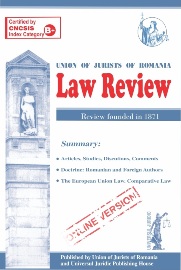
Keywords: PPP contracts Colombia; private financial market; public infrastructure; financing system; Basel III regulation;
PPPs, structured under Project Finance standards, form a system determined by a normative complex organized by subsystems and interacting and interdependent elements conditioned by a process of control and communication. This systematic nature has an effect on the legal configuration of the content of the PPP contract. It was shown that financing depends, on the one hand, on budgets that condition it and, on the other, it acts as a determinant of other elements of the system; so that there is a close relationship between the financing of the project and the challenge of contractual management. The correspondence between the components of the project finance system is of reciprocal conditioning and is determined by the communication between its parts.
More...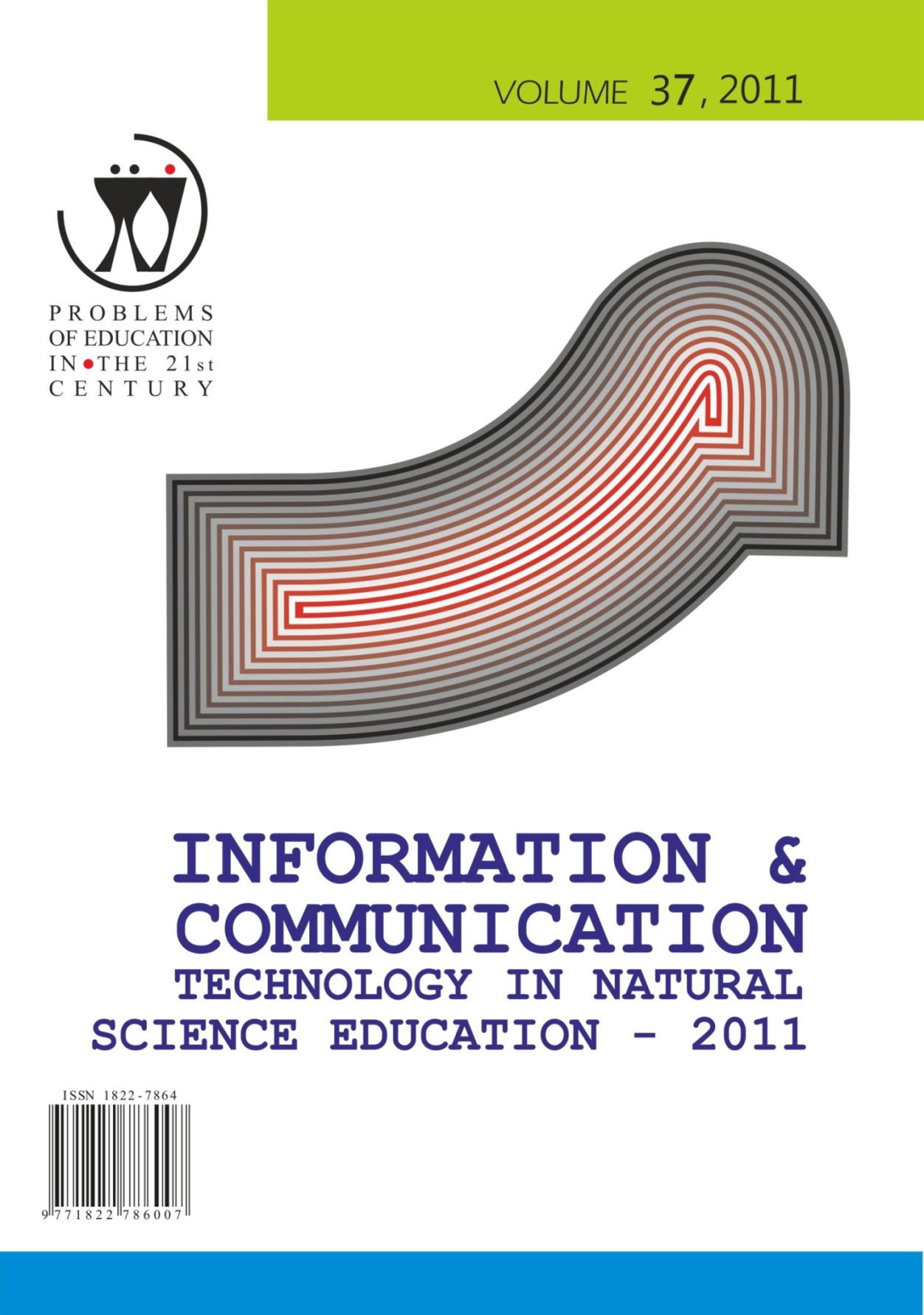
Keywords: teacher education; visualization; visual tools;
The accelerated development of information and communication technologies followed by several studies in the cognitive theory area, have promoted the use and the construction of many visual tools (3D concrete models, statics or dynamics virtual 2D and 3D images, simulations, animations, interactive software, etc) that have been available to educators. With this research it was aimed to investigate how in-service teachers (n=14) enrolled in a teachers’ training course of 40h, understand the nature and the role of visualizations in science teaching as well as the impact of this training. It was also discussed the nature and role of models in science. During the training teachers were invited to build in group teaching learning sequences (TLS) about some science content using visualizations. At the beginning a questionnaire to identify some previous conceptions on this issue have been applied and analyzed. On a later stage it was analyzed the TLS made by them and the audiovisual record of their oral communications to the class. It was also analyzed the final semi-structured interview with these teachers’ groups. As main results we highlight a development of the knowledge about these tools, especially on the impact of the visual language on apprenticeship and on the notion of scientific model. We could also observe a change on the reasons and criteria to use these tools. According to the findings it can be said that this training has expanded the teachers’ initial notion of models and the theoretical background that support the use of this visual resources which was reflected on theirs TLS.
More...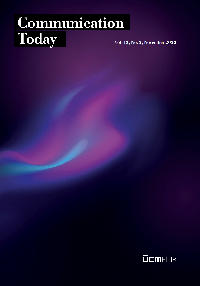
Keywords: artificial scarcity; collecting; digital games; limited-print games; physical media
Among other things, digital games can be considered valuable cultural artefacts, and in their physical form, they are inherently collectable. The study aims to reflect on digital game collecting and investigate the impact it has on the contemporary digital games industry. The current trend we would like to focus on further is the influx of ‘limited-print run’ companies and their products, i.e., small-scale companies that produce physical copies of otherwise digital-only games in a limited quantity or within a limited time frame. The study aims to examine the impact of limited-print game distribution on the digital games market, as well as explore what the emergence of this trend can mean in terms of the current state of the digital games industry from the collectors’ perspective. The study is largely theoretical; the methods of logical reasoning, i.e., analysis, synthesis, specification, comparison and wider generalisation are used to address the given topic. The discussed issues are then interpreted in relation to today’s digital games industry, more specifically to some of its key products.
More...